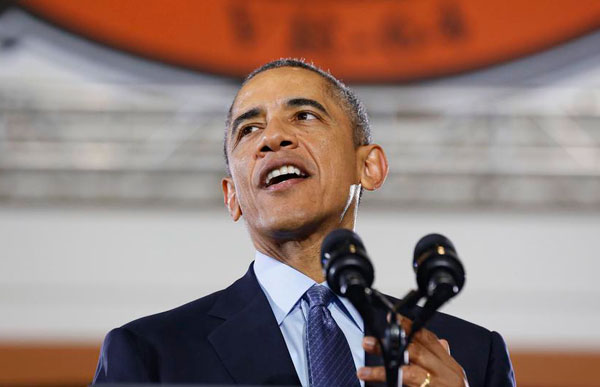 |
|
US President Barack Obama speaks at Joint Base McGuire-Dix-Lakehurst in New Jersey, December 15, 2014. [Photo/Agencies] |
The recent announcement of the United States and Cuba to re-establish diplomatic relations, signaling the beginning of normalization of bilateral ties, is a welcome development. While there will be bumps on the road, the move will succeed and have significant consequences for the Americas and beyond despite the braying of Cold War dinosaurs trapped in the ice of a bygone era.
The announcement should come as little surprise to those following the developments between Havana and Washington. It was only a matter of time before the planets aligned.
US President Barack Obama, while campaigning for the presidential election in 2008, told a leading anti-Fidel Castro exile group that the decades-old approach of isolating Cuba was a failure and that he would change that if elected. He made good on his promise at the beginning of his presidency when he announced a series of measures in April 2009.
Until recently it was considered an act of political suicide to ruffle feathers in the critical swing state of Florida, where the 1.5 million Cuban-American community centered in Miami has largely determined the fate of many presidential, state and local candidates. Remember the 2000 presidential election when Florida determined the outcome by 537 votes out of almost 6 million cast? Almost 75 percent of the Cuban-Americans had voted for the winner.
But times have changed. Obama lost the Cuban-American vote in 2008, but won it in 2012. Multiple opinion surveys have shown that the older Cuban-Americans, alive when Fidel Castro and Che Guevara assumed power, remain deeply conservative and rabidly hostile to any thaw with Cuba. But the second- and third-generation Cuban-Americans in general favor liberalization. This has profound electoral implications because Hispanics, the fastest growing voting bloc, are solidly behind the Democrats, motivated by social justice and bread-and-butter issues. And by eliminating the Cuban fixation, the Democrats can bring more Cuban-Americans into their fold.
Besides, Obama could be playing electoral chess. Florida Senator Marco Rubio, who is the grandson of Cuban immigrants, and former Florida governor Jeb Bush - both likely presidential contenders in 2016 - have criticized Obama's initiative using extreme rhetoric harking back to the Cold War days. Both are out of sync not only with Cuban-Americans, but also with US citizens as a whole. On the other hand, likely Democratic presidential nominee and former secretary of state, Hillary Clinton has been a longtime advocate of liberalization. In every Gallup poll since 1999, the majority of Americans have favored normalizing US-Cuban relations (55-71 percent), and most have supported ending the US embargo.